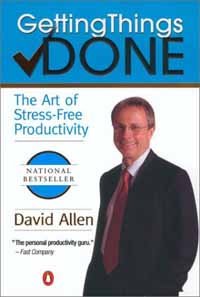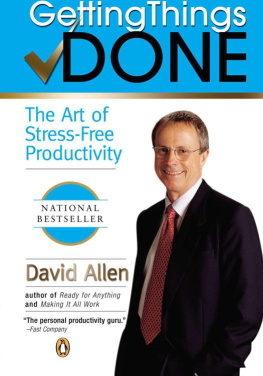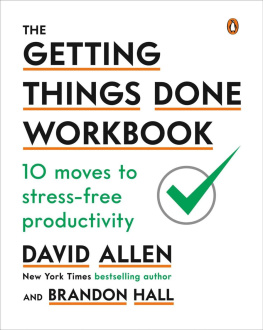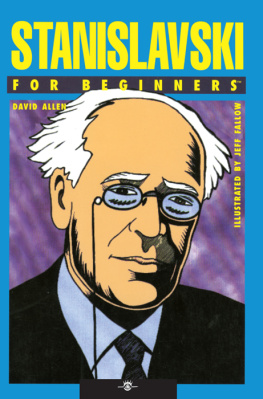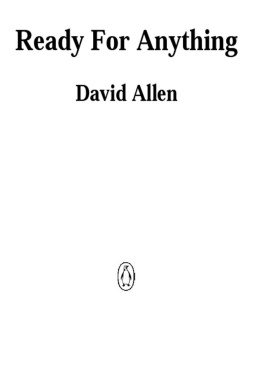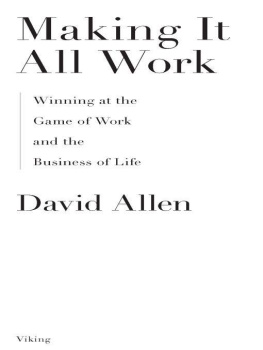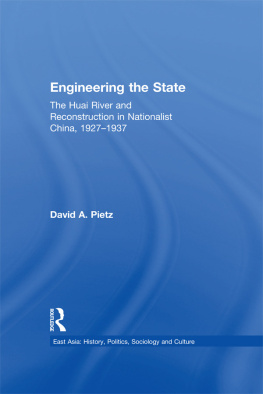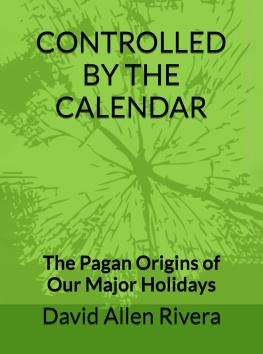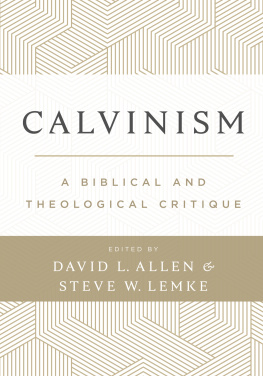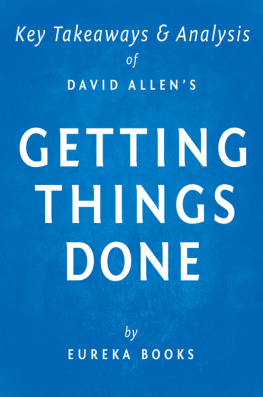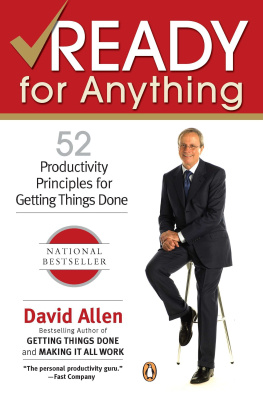Getting Things Done
The Art of Stress-Free Productivity
Praise for Getting Things Done
"The Season's Best Reads for Work-Life Advice .. . my favorite on organizing your life: Getting Things Done . . . offers help building the new mental skills needed in an age of multitasking and overload."
Sue Shellenbarger, The Wall Street Journal
"I recently attended David's seminar on getting organized, and after seeing him in action I have hope . .. David Allen's seminar was an eye-opener."
Stewart Alsop, Fortune
"Allen drops down from high-level philosophizing to the fine details of time management. Take a minute to check this one out."
Mark Henricks, Entrepreneur
"David Allen's productivity principles are rooted in big ideas ... but they're also eminently practical."
Keith H. Hammonds, Fast Company
"David Allen brings new clarity to the power of purpose, theessential nature of relaxation, and deceptively simple guidelinesfor getting things done. He employs extensive experience, personal stories, and his own recipe for simplicity, speed, and fun."
Frances Hesselbein, chairman, board of governors,The Drucker Foundation
"Anyone who reads this book can apply this knowledge and these skills in their lives for immediate results."
Stephen P. Magee, chaired professor of business and economics, University of Texas at Austin
"A true skeptic of most management fixes, I have to say David's program is a winner!"
Joline Godfrey, CEO, Independent Means, Inc. and author of Our Wildest Dreams
"Getting Things Done describes an incredibly practical process that can help busy people regain control of their lives. It can help you be more successful. Even more important, it can help you have a happier life!"
Marshall Goldsmith, coeditor, The Leader of the Future and Coaching for Leadership
"WARNING: Reading Getting Things Done can be hazardous to your old habits of procrastination. David Allen's approach is refreshingly simple and intuitive. He provides the systems, tools, and tips to achieve profound results."
Carola Endicott, director, Quality Resources, New England Medical Center
Welcome to Getting Things Done
WELCOME TO A gold mine of insights into strategies for how to have more energy, be more relaxed, and get a lot more accomplished with much less effort. If you're like me, you like getting things done and doing them well, and yet you also want to savor life in ways that seem increasingly elusive if not downright impossible if you're working too hard. This doesn't have to be an either-or proposition. It is possible to be effectively doing while you are delightfully being, in your ordinary workaday world.
I think efficiency is a good thing. Maybe what you're doing is important, interesting, or useful; or maybe it isn't but it has to be done anyway. In the first case you want to get as much return as you can on your investment of time and energy. In the second, you want to get on to other things as fast as you can, without any nagging loose ends.
The art of resting the mind and the power of dismissing from it all care and worry is probably one of the secrets of our great men.
Captain A.
And whatever you're doing, you'd probably like to be more relaxed, confident that whatever you're doing at the moment is just what you need to be doingthat having a beer with your staff after hours, gazing at your sleeping child in his or her crib at midnight, answering the e-mail in front of you, or spending a few informal minutes with the potential new client after the meeting is exactly what you ought to be doing, as you're doing it.
Teaching you how to be maximally efficient and relaxed, whenever you need or want to be, was my main purpose in writing this book.
I have searched for a long time, as you may have, for answers to the questions of what to do, when to do it, and how to do it. And after twenty-plus years of developing and applying new methods for personal and organizational productivity, alongside years of rigorous exploration in the self-development arena, I can attest that there is no single, once-and-for-all solution. No soft-ware, seminar, cool personal planner, or personal mission statement will simplify your workday or make your choices for you as you move through your day, week, and life. What's more, just when you learn how to enhance your productivity and decision-making at one level, you'll graduate to the next accepted batch of responsibilities and creative goals, whose new challenges will defy the ability of any simple formula or buzzword-du-jour to get you what you want, the way you want to get it.
But if there's no single means of perfecting personal organization and productivity, there are things we can do to facilitate them. As I have personally matured, from year to year, I've found deeper and more meaningful, more significant things to focus on and be aware of and do. And I've uncovered simple processes that we can all learn to use that will vastly improve our ability to deal proactively and constructively with the mundane realities of the world.
What follows is a compilation of more than two decades' worth of discoveries about personal productivitya guide to maximizing output and minimizing input, and to doing so in a world in which work is increasingly voluminous and ambiguous. I have spent many thousands of hours coaching people "in the trenches" at their desks, helping them process and organize all of their work at hand. The methods I have uncovered have proved to be highly effective in all types of organizations, at every job level, across cultures, and even at home and school. After twenty years of coaching and training some of the world's most sophisticated and productive professionals, I know the world is hungry for these methods.
Executives at the top are looking to instill "ruthless execution" in themselves and their people as a basic standard. They know, and I know, that behind closed doors, after hours, there remain unanswered calls, tasks to be delegated, unprocessed issues from meetings and conversations, personal responsibilities unmanaged, and dozens of e-mails still not dealt with. Many of these businesspeople are successful because the crises they solve and the opportunities they take advantage of are bigger than the problems they allow and create in their own offices and briefcases. But given the pace of business and life today, the equation is in question.
On the one hand, we need proven tools that can help people focus their energies strategically and tactically without letting anything fall through the cracks. On the other, we need to create work environments and skills that will keep the most invested people from burning out due to stress. We need positive work-style standards that will attract and retain the best and brightest.
We know this information is sorely needed in organizations. It's also needed in schools, where our kids are still not being taught how to process information, how to focus on outcomes, or what actions to take to make them happen. And for all of us individually, it's needed so we can take advantage of all the opportunities we're given to add value to our world in a sustainable, self-nurturing way.
The power, simplicity, and effectiveness of what I'm talking about in Getting Things Done are best experienced as experiences, in real time, with real situations in your real world. Necessarily, the book must put the essence of this dynamic art of workflow management and personal productivity into a linear format. I've tried to organize it in such a way as to give you both the inspiring big-picture view and a taste of immediate results as you go along.

